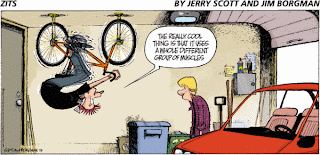Not only does humor help us overcome our own challenges in life, it also helps us in our relationships with others. Looking at our kids, for example, from a humorous perspective helps downgrade the seriousness of things they do and say, such as in the example above: "I told you it wasn't just him."
A good laugh helps us recognize how ridiculous it is to get worked up over matters that are trivial, such as the demand for attention when our kids or teenagers are otherwise in their own minds (often thinking about pressures at school or home), our demands for cleanliness (show me a perfectly clean home, and I'll show you a perfectly unhappy family), or our own need to be heard (Have I made myself clear?).
The gist here is to redirect antagonizing or otherwise poor communication toward the funny distractions that humor offers. Not only does it help us chill out, it helps us express concepts that might otherwise be difficult to discuss, such as the fact that most parents report feeling utterly ridiculous saying most of the things they end up saying to their kids.
"The fools in Shakespeare's plays see things realistically but their ironic fate is that they are not taken seriously." Arthur Asa Berger.
Humor teaches us many valuable lessons without the serious label. This allows the sense of dignity to stay intact while simultaneously pointing out opportunities to make corrections in our behavior. The boy checking out the globe is a way of saying, "The keys could be anywhere, Dad." Without having to say that he doesn't have a clue as to where he left them.
This purges us of negative emotions like guilt, encouraging playfulness and openness - something most parents and teens complain is lacking in their relationship.
The differences in parental roles compared to those of our children are highlighted in the above comic. Exaggeration (despite the realities behind getting ready in the morning) often demonstrate the habits we pick up which result in either obsession and compulsive behavior, such as getting ready when there's no where to go.
If there was an important outing, the teen would probably (1) have their backpack or suitcase ready to leave - giving them more time to sleep in; (2) relax (such as in this comic) knowing that their responsible parents are taking care of things. In this way, I guess you could consider the teen's lack of concern as faith and confidence in their parent (rather than apathy), a feeling that wouldn't exist were it not for the fact that their parents already demonstrated those qualities.
There's a good deal of confusion in our vastly changing technological world as to what to do with our lives, both from a perspective of career choices as well as determining what our "life's mission" is to be.
Adults as well as kids experience this, which makes it a universal concern. Teenagers are limited in their world view due to lack of experience and the fact that they are not yet responsible for a family. This allows for the wild imaginings seen in the above comic in the face of finding meaning behind what is no doubt a meaningless book report (in the grand scheme of life).
Existential angst is often more profound in gifted children, though this angst seems to be a predominant cultural condition that is accompanying our present shift from being a post-industrial world to a highly-connected global community.
"I AM up. I'm just not UP-Up" is a common American expression. It means: "I'm awake, and I know I need to get up - but I'm having difficulty doing so."
Laughing about fatigue and other physical realities of living minimizes frustrations with teenagers who are overly tired from the ridiculous amount of pressures and demands that are placed on them as well as from physiological changes that accompany puberty.
Jokes help us remember when we ourselves were experiencing these issues as well as highlighting what we'd probably rather do in the morning - i.e., stay in bed until it is absolutely necessary to get up.
Most kids perform the smell test when getting ready. Domestic skills are learned, not inherited. The element of "funny realizations" help us process the fact that younger people haven't yet mastered daily living skills, which for some parents can be perceived as kinda nice knowing that their kids "still need them."
Jokes like this usually make both parents and teens smile.
Finding authority in thinking is experimental. We ask ourselves what's important to most people and then try to associate our behavior to that concept. Doing something "silly" like this highlights a teens need to express their value and worth in worldly terms such as appealing to authority, i.e., their own understanding and recognition of it.
Assuming you can get your hands on your teenagers cell phone (a miracle in itself), changing their ringtone in association with your number can be a hilarious prank to play on your kid, and one that will no doubt earn "cudos" to the creative parent who pulls it off - respect for their parent's ability to operate technology as well as a glimmer of "coolness" for having done so creatively or with a sense of funniness.









2 comments:
LOL's :D
I remember all to well calling home while at at SENG conference only to get the answering machine message my daughter rerecorded with a halarious spiel from a mental health hotline!
Post a Comment